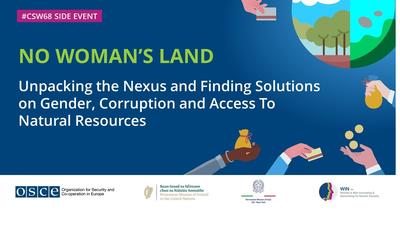-
Our work
-
Fields of work
- Arms control
- Border management
- Combating trafficking in human beings
- Conflict prevention and resolution
- Countering terrorism
- Cyber/ICT Security
- Democratization
- Economic activities
- Education
- Elections
- Environmental activities
- Gender equality
- Good governance
- Human rights
- Media freedom and development
- Migration
- National minority issues
- Policing
- Reform and co-operation in the security sector
- Roma and Sinti
- Rule of law
- Tolerance and non-discrimination
- Youth
- Field operations
- Projects
-
Meetings and conferences
- Summit meetings
- Review Conferences
- Ministerial Council meetings
- Plenary meetings of the Permanent Council
- Plenary Meetings of the Forum for Security Co-operation
- Security Review Conferences
- Annual Implementation Assessment Meetings
- Economic and Environmental Forum
- Economic and Environmental Dimension Implementation Meetings
- Human rights meetings
- Media conferences
- Cyber/ICT security conferences
- Conference of the Alliance against Trafficking in Persons
- Gender equality conferences
- Annual OSCE Mediterranean conferences
- Annual OSCE Asian conferences
- Partnerships
-
Fields of work
-
Countries
- All
-
Participating States
- Albania
- Andorra
- Armenia
- Austria
- Azerbaijan
- Belgium
- Belarus
- Bosnia and Herzegovina
- Bulgaria
- Canada
- Croatia
- Cyprus
- Czechia
- Denmark
- Estonia
- Finland
- France
- Georgia
- Germany
- Greece
- Holy See
- Hungary
- Iceland
- Ireland
- Italy
- Kazakhstan
- Kyrgyzstan
- Latvia
- Liechtenstein
- Lithuania
- Luxembourg
- Malta
- Moldova
- Monaco
- Mongolia
- Montenegro
- The Netherlands
- North Macedonia
- Norway
- Poland
- Portugal
- Romania
- Russian Federation
- San Marino
- Serbia
- Slovakia
- Slovenia
- Spain
- Sweden
- Switzerland – OSCE Chairpersonship 2026
- Tajikistan
- Türkiye
- Turkmenistan
- Ukraine
- United Kingdom
- United States of America
- Uzbekistan
- Asian Partners for Co-operation
- Mediterranean Partners for Co-operation
-
Structures and institutions
- Chairpersonship
-
Secretariat
- Secretary General
- Office of the Secretary General
- Conflict Prevention Centre
- Transnational Threats Department
- Office of the Special Representative and Co-ordinator for Combating Trafficking in Human Beings
- Office of the Co-ordinator of OSCE Economic and Environmental Activities
- Gender Issues Programme
- Opportunities for Youth
- Department of Human Resources
- Department of Management and Finance
- Office of Internal Oversight
- Documentation Centre in Prague
- Institutions
-
Field operations
- Presence in Albania
- Centre in Ashgabat
- Programme Office in Astana
- Programme Office in Bishkek
- Mission to Bosnia and Herzegovina
- Programme Office in Dushanbe
- Mission in Kosovo
- Mission to Moldova
- Mission to Montenegro
- Mission to Serbia
- Mission to Skopje
- Project Co-ordinator in Uzbekistan
- Closed field activities
- Parliamentary Assembly
- Court of Conciliation and Arbitration
- Organizational structure
- About us
News Item
OSCE addresses connection between gender, corruption and natural resources
On 13 March 2024, the OSCE Gender Issues Programme WIN Project, co-hosted together with Italy and Ireland, a side event titled "No Woman’s Land: Unpacking the Nexus and Finding Solutions on Gender, Corruption and Access to Natural Resources" at the margins of the 68th Commission on the Status of Women (CSW68) in New York.

- Issued on:
- Issued by:
- OSCE Secretariat
- Fields of work:
- Gender equality
On 13 March 2024, the OSCE Gender Issues Programme WIN Project, co-hosted together with Italy and Ireland, a side event titled "No Woman’s Land: Unpacking the Nexus and Finding Solutions on Gender, Corruption and Access to Natural Resources" at the margins of the 68th Commission on the Status of Women (CSW68) in New York.
The event, chaired by the OSCE Senior Advisor on Gender Issues Lara Scarpitta, brought together international and civil society experts as well as academia and provided a platform for panellists and experts to explore the nexus between gender and corruption, particularly focusing on its impact on women's access to natural resources. The political, environmental, social and economic ramifications of corruption were also discussed.
In her recorded opening remarks, OSCE Secretary General Helga Maria Schmid emphasized the impact of corruption, stating that “Corruption is not gender neutral and it affects women disproportionally. This is why we need targeted and gender-responsive policies. It is time to unlock women’s potential in fighting corruption and to remove any barrier that stands in their way to full empowerment in our societies.”
The new research on "Gender and Corruption in the Access to Natural Resources: Preliminary Findings," was presented during the side event. The report examines how women’s economic empowerment and participation in decision-making are affected by corruptive practices in four sectors: water, land, forestry and extractive industries.
Participants also discussed the pervasive nature of corruption across various contexts such as peace and mediation efforts and in humanitarian settings. Speakers highlighted the advantages and necessity of integrating women into decision-making processes, especially in humanitarian settings and in the field of mediation and negotiations for access to critical natural resources such as water and land.
In addition, experts addressed best practices for empowering women, promoting women’s leadership and ensuring gender equality in the management of natural resources. Speakers made recommendations for policymakers to promote gender-responsive policies and approaches.
Speakers included Dr. Michael Breen (Professor, Dublin City University), Joachime Nason (Head of the Humanitarian Section, EU Delegation to the UN in New York), Dr. Ayse Betul Celik (Professor, Sabanci University & Mediterranean Women’s Mediators Network) and Maria Victoria Cabrera Balleza (Chief Executive Officer, Global Network of Women Peacebuilders).